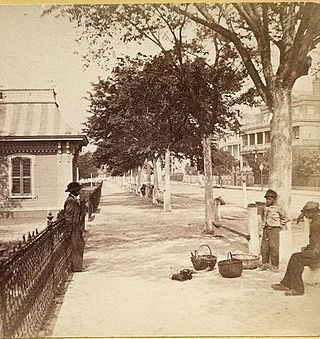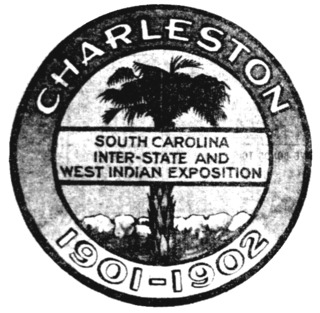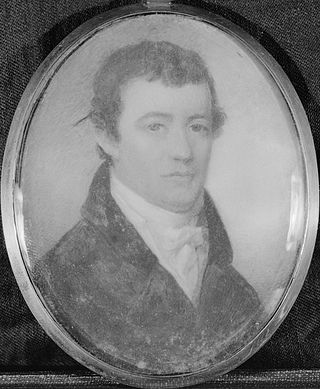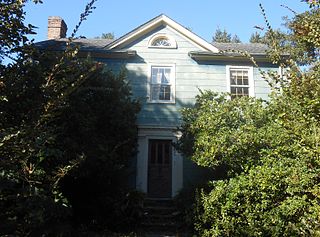
Walhalla is a city in the foothills of the Blue Ridge Mountains in Oconee County,South Carolina. Designated in 1868 as the county seat,it lies within the area of the Blue Ridge Escarpment,an area of transition between mountains and piedmont,and contains numerous waterfalls. It is located 16 miles (26 km) from Clemson University in Clemson,South Carolina.

White Point Garden is a 5.7 acre public park located in peninsular Charleston,South Carolina,at the tip of the peninsula. It is the southern terminus for the Battery,a defensive seawall and promenade. It is bounded by East Battery,Murray Blvd.,King St.,and South Battery.

Robert Barnwell Rhett was an American politician who served as a deputy from South Carolina to the Provisional Confederate States Congress from 1861 to 1862,a member of the US House of Representatives from South Carolina from 1837 to 1849,and US Senator from South Carolina from 1850 to 1852. As a staunch supporter of slavery and an early advocate of secession,he was a "Fire-Eater",nicknamed the "father of secession".

Joseph Patrick Riley Jr. is an American politician who was the Mayor of Charleston,South Carolina. He was one of the longest serving mayors in the United States that is still living,having served 10 terms starting on December 15,1975,and ending on January 11,2016.

Johnson Hagood Stadium,is an 11,500-seat football stadium,the home field of The Citadel Bulldogs football team,in Charleston,South Carolina,United States. The stadium is named in honor of Brigadier General Johnson Hagood,CSA,class of 1847,who commanded Confederate forces in Charleston during the Civil War and later served as Comptroller and Governor of South Carolina.
The Charleston School of Law is a private for-profit law school in Charleston,South Carolina. It was established in 2003 and accredited by the American Bar Association (ABA) in August 2011. The school was founded upon a principle of promoting public service by its students and graduates;each student must perform at least 50 hours of public service before graduation. According to the school's 2021 ABA-required disclosures,85% of the Class of 2017 obtained full-time,long-term,JD-required employment nine months after graduation.
More than 1,500 African American officeholders served during the Reconstruction era (1865–1877) and in the years after Reconstruction before white supremacy,disenfranchisement,and the Democratic Party fully reasserted control in Southern states. Historian Canter Brown Jr. noted that in some states,such as Florida,the highest number of African Americans were elected or appointed to offices after the end of Reconstruction in 1877. The following is a partial list of notable African American officeholders from the end of the Civil War until before 1900. Dates listed are the year that a term states or the range of years served if multiple terms.

The South Carolina Inter-State and West Indian Exposition,commonly called the Charleston Exposition or the West Indian Exposition,was a multi-county fair and regional trade exposition held in Charleston,South Carolina from December 1,1901 to June 20,1902.

Magnolia Cemetery is a historic rural cemetery in Charleston,South Carolina. The first board for the cemetery was assembled in 1849 with Edward C. Jones as the architect. It was dedicated in 1850;Charles Fraser delivered the dedication address. It was listed on the National Register of Historic Places as a Historic District in 1978.

The German Evangelical Lutheran Church of Charleston,South Carolina,was incorporated on December 3,1840. Through usage and custom the Church is now known as St. Matthew's German Evangelical Lutheran Church or St. Matthew's Lutheran Church and is a member of the South Carolina Synod of the Evangelical Lutheran Church in America.
The following is a timeline of the history of Charleston,South Carolina,USA.
Wendell G. Gilliard is an American politician,steelworker,and union official. A Democrat,Gilliard serves as a member of the South Carolina House of Representatives,representing the 111th district.
Gilbert Pillsbury was the Reconstruction mayor of Charleston,South Carolina,and he served one term from 1868 to 1871. He ran against William Patton and Chancellor Lesesne. Due to election challenges,he was installed as mayor only in May 1869. He was again nominated for a second term in 1871,but lost to Johann Andreas Wagener.
William W. Sale was the forty-fifth mayor of Charleston,South Carolina,serving one term from 1877 to 1879. He was born in September 1819 in South Carolina and married Edith Cleapor in about 1871. Before being elected,Sale worked as a teller at the First National Bank in Charleston. Sale was endorsed by the Charleston News &Courier,and he was elected on December 11,1877 by a margin of 5,288 to 1,924 in an election against D.F. Fleming. Sale was inducted on December 17,1877. As mayor,Sale lived on Chinquapin Street. After leaving office,he was the master of the Charleston Alms House. In 1900,he was living in Summerville,South Carolina.

Elias Horry was a lawyer,politician,businessman and plantation owner who twice served in the South Carolina General Assembly as well as the intendant (mayor) of Charleston,South Carolina,serving two terms from 1815 to 1817 and 1820 to 1821.

Daniel Stevens was the twenty-fourth intendant (mayor) of Charleston,South Carolina,serving from 1819 to 1820.
Jacob Moorer was a South Carolina lawyer and civil rights activist. He frequently fought cases in opposition to the elector provisions of the 1895 South Carolina Constitution,which he viewed as disenfranchising blacks. His most famous case was Franklin v. South Carolina,a murder case involving black sharecropper Pink Franklin which he and John Adams,Sr. appealed to the United States Supreme Court.
Stephen Thomas was an architect who practiced mainly in Charleston,South Carolina for about 27 years.

Wagener Terrace in Charleston,South Carolina is a large neighborhood made property that had been owned by Louis Dunnemann and Capt. F.W. Wagener.
Jordan Pace is an American politician of the Republican Party. He is the member of the South Carolina House of Representatives representing District 117. In the 2022 general election for South Carolina House of Representatives District 117,he defeated Democratic incumbent Krystle Matthews,who had been a member of the South Carolina House since 2018. Matthews was running simultaneously for the US Senate seat held by Republican incumbent Tim Scott,who ultimately defeated her in that race.












